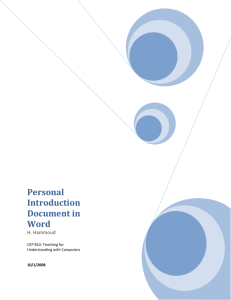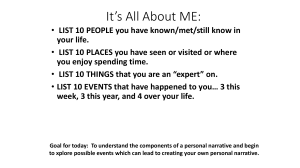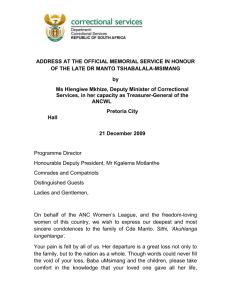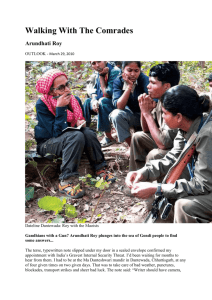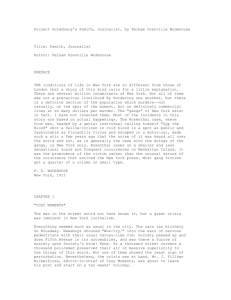All Quiet on the Western Front
advertisement
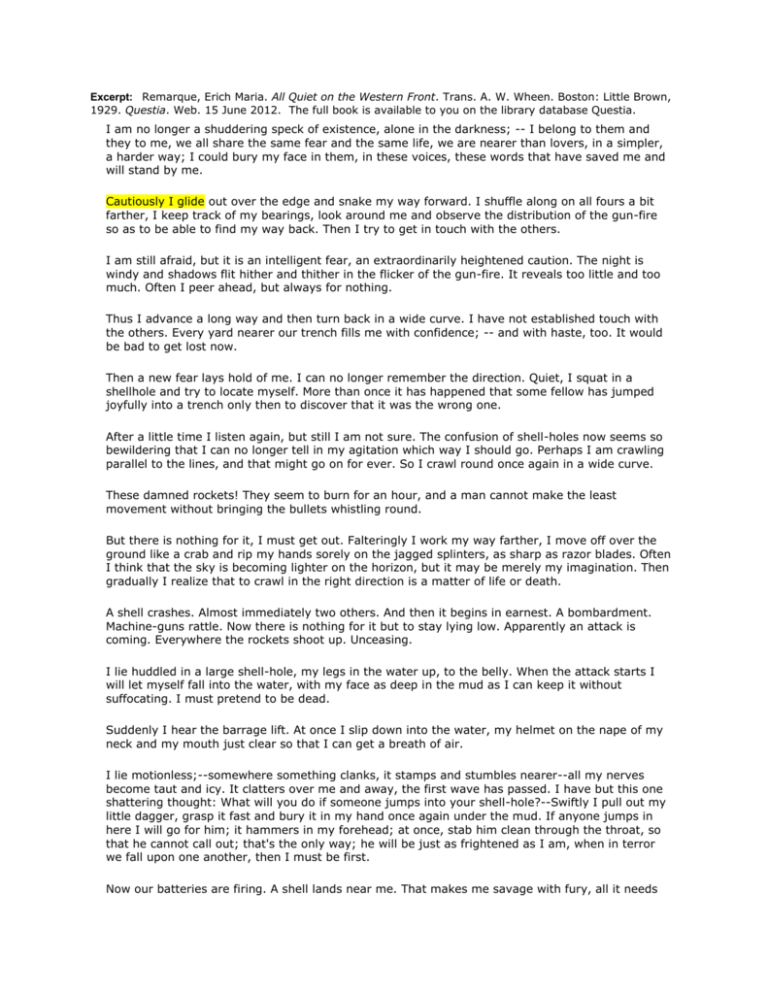
Excerpt: Remarque, Erich Maria. All Quiet on the Western Front. Trans. A. W. Wheen. Boston: Little Brown, 1929. Questia. Web. 15 June 2012. The full book is available to you on the library database Questia. I am no longer a shuddering speck of existence, alone in the darkness; -- I belong to them and they to me, we all share the same fear and the same life, we are nearer than lovers, in a simpler, a harder way; I could bury my face in them, in these voices, these words that have saved me and will stand by me. Cautiously I glide out over the edge and snake my way forward. I shuffle along on all fours a bit farther, I keep track of my bearings, look around me and observe the distribution of the gun-fire so as to be able to find my way back. Then I try to get in touch with the others. I am still afraid, but it is an intelligent fear, an extraordinarily heightened caution. The night is windy and shadows flit hither and thither in the flicker of the gun-fire. It reveals too little and too much. Often I peer ahead, but always for nothing. Thus I advance a long way and then turn back in a wide curve. I have not established touch with the others. Every yard nearer our trench fills me with confidence; -- and with haste, too. It would be bad to get lost now. Then a new fear lays hold of me. I can no longer remember the direction. Quiet, I squat in a shellhole and try to locate myself. More than once it has happened that some fellow has jumped joyfully into a trench only then to discover that it was the wrong one. After a little time I listen again, but still I am not sure. The confusion of shell-holes now seems so bewildering that I can no longer tell in my agitation which way I should go. Perhaps I am crawling parallel to the lines, and that might go on for ever. So I crawl round once again in a wide curve. These damned rockets! They seem to burn for an hour, and a man cannot make the least movement without bringing the bullets whistling round. But there is nothing for it, I must get out. Falteringly I work my way farther, I move off over the ground like a crab and rip my hands sorely on the jagged splinters, as sharp as razor blades. Often I think that the sky is becoming lighter on the horizon, but it may be merely my imagination. Then gradually I realize that to crawl in the right direction is a matter of life or death. A shell crashes. Almost immediately two others. And then it begins in earnest. A bombardment. Machine-guns rattle. Now there is nothing for it but to stay lying low. Apparently an attack is coming. Everywhere the rockets shoot up. Unceasing. I lie huddled in a large shell-hole, my legs in the water up, to the belly. When the attack starts I will let myself fall into the water, with my face as deep in the mud as I can keep it without suffocating. I must pretend to be dead. Suddenly I hear the barrage lift. At once I slip down into the water, my helmet on the nape of my neck and my mouth just clear so that I can get a breath of air. I lie motionless;--somewhere something clanks, it stamps and stumbles nearer--all my nerves become taut and icy. It clatters over me and away, the first wave has passed. I have but this one shattering thought: What will you do if someone jumps into your shell-hole?--Swiftly I pull out my little dagger, grasp it fast and bury it in my hand once again under the mud. If anyone jumps in here I will go for him; it hammers in my forehead; at once, stab him clean through the throat, so that he cannot call out; that's the only way; he will be just as frightened as I am, when in terror we fall upon one another, then I must be first. Now our batteries are firing. A shell lands near me. That makes me savage with fury, all it needs now is to be killed by our own shells; I curse and grind my teeth in the mud; it is a raving frenzy; in the end all I can do is groan and pray. The crash of the shells bursts in my ears. If our fellows make a counter-raid I will be saved. I press my head against the earth and listen to the muffled thunder, like the explosions of quarrying--and raise it again to listen for the sounds on top. The machine-guns rattle. I know our barbed-wire entanglements are strong and almost undamaged; --parts of them are charged with a powerful electric current. The rifle-fire increases. They have not broken through; they have to retreat. I sink down again, huddled, strained to the uttermost. The banging, the creeping, the clanging becomes audible. One single cry yelling amongst it all. They are raked with fire, the attack is repulsed. Already it has become somewhat lighter. Steps hasten over me. The first. Gone. Again, another. The rattle of machine-guns becomes an unbroken chain. Just as I am about to turn round a little, something heavy stumbles, and with a crash a body falls over me into the shell-hole, slips down, and lies across me----I do not think at all, I make no decision--I strike madly home, and feel only how the body suddenly convulses, then becomes limp, and collapses. When I recover myself, my hand is sticky and wet. The man gurgles. It sounds to me as though he bellows, every gasping breath is like a cry, a thunder --but it is only my heart pounding. I want to stop his mouth, stuff it with earth, stab him again, he must be quiet, he is betraying me; now at last I regain control of myself, but have suddenly become so feeble that I cannot any more lift my hand against him. So I crawl away to the farthest corner and stay there, my eyes glued on him, my hand grasping the knife--ready, if he stirs, to spring at him again. But he won't do so any more, I can hear that already in his gurgling. I can see him indistinctly. I have but one desire, to get away. If it is not soon it will be too light; it will be difficult enough now. Then as I try to raise up my head I see it is impossible already. The machine-gun fire so sweeps the ground that I would be shot through and through before I could make one jump. I test it once with my helmet, which I take off and hold up to find out the level of the shots. The next moment it is knocked out of my hand by a bullet. The fire is sweeping very low over the ground. I am not far enough from the enemy line to escape being picked off by one of the snipers if I attempt to get away. The light increases. Burning I wait for our attack. My hands are white at the knuckles, I clench them so tightly in my longing for the fire to cease so that my comrades may come. Minute after minute trickles away. I dare not look again at the dark figure in the shell-hole. With an effort I look past it and wait, wait. The bullets hiss, they make a steel net, never ceasing, never ceasing. Then I notice my bloody hand and suddenly feel nauseated. I take some earth and rub the skin with it, now my hand is muddy and the blood cannot be seen any more. The fire does not diminish. It is equally heavy from both sides. Our fellows have probably given me up for lost long ago. It is early morning, clear and grey. The gurgling continues, I stop my ears, but soon take my fingers away again, because then I cannot hear the other sound. The figure opposite me moves. I shrink together and involuntarily look at it. Then my eyes remain glued to it. A man with a small pointed beard lies there, his head is fallen to one side, one arm is halfbent, his head rests helplessly upon it. The other hand lies on his chest, it is bloody. He is dead, I say to myself, he must be dead, he doesn't feel anything any more; it is only the body that is gurgling there. Then the head tries to raise itself, for a moment the groaning becomes louder, his forehead sinks back upon his arm. The man is not dead, he is dying, but he is not dead. I drag myself toward him, hesitate, support myself on my hands, creep a bit farther, wait, again a terrible journey of three yards, a long, a terrible journey. At last I am beside him. Then he opens his eyes. He must have heard me and gazes at me with a look of utter terror. The body lies still, but in the eyes there is such an extraordinary expression of flight that for a moment I think they have power enough to carry the body off with them. Hundreds of miles away with one bound. The body is still, perfectly still, without sound, the gurgle has ceased, but the eyes cry out, yell, all the life is gathered together in them for one tremendous effort to flee, gathered together there in a dreadful terror of death, of me. My legs give way and I drop on my elbows. "No, no," I whisper. The eyes follow me. I am powerless to move so long as they are there. Then his hand slips slowly from his breast, only a little bit, it sinks just a few inches, but this movement breaks the power of the eyes. I bend forward, shake my head and whisper: "No, no, no." I raise one hand, I must show him that I want to help him, I stroke his forehead. The eyes shrink back as the hand comes, then they lose their stare, the eyelids droop lower, the tension is past. I open his collar and place his head more comfortably upright. His mouth stands half open, it tries to form words. The lips are dry. My water bottle is not there. I have not brought it with me. But there is water in the mud, down at the bottom of the crater. I climb down, take out my handkerchief, spread it out, push it under and scoop up the yellow water that strains through into the hollow of my hand. He gulps it down. I fetch some more. Then I unbutton his tunic in order to bandage him if it is possible. In any case I must do it, so that if the fellows over there capture me they will see that I wanted to help him, and so will not shoot me. He tries to resist, but his hand is too feeble. The shirt is stuck and will not come away, it is buttoned at the back. So there is nothing for it but to cut it off. I look for the knife and find it again. But when I begin to cut the shirt the eyes open once more and the cry is in them again and the demented expression, so that I must close them, press them shut and whisper: "I want to help you, Comrade, camerade, camerade, camerade-----" eagerly repeating the word, to make him understand. There are three stabs. My field dressing covers them, the blood runs out under it, I press it tighter; there; he groans. That is all I can do. Now we must wait, wait. These hours.... The gurgling starts again -but how slowly a man dies! For this I know -- he cannot be saved. Indeed, I have tried to tell myself that he will be, but at noon this pretence breaks down and melts before his groans. If only I had not lost my revolver crawling about, I would shoot him. Stab him I cannot. By noon I am groping on the outer limits of reason. Hunger devours me, I could almost weep for something to eat, I cannot struggle against it. Again and again I fetch water for the dying man and drink some myself. This is the first man I have killed with my hands, whom I can see close at hand, whose death is my doing. Kat and Kropp and Müller have experienced it already, when they have hit someone; it happens to many, in hand-to-hand fighting especially -But every gasp lays my heart bare. This dying man has time with him, he has an invisible dagger with which he stabs me: Time and my thoughts. I would give much if he would but stay alive. It is hard to lie here and to have to see and hear him. In the afternoon, about three, he is dead. I breathe freely again. But only for a short time. Soon the silence is more unbearable than the groans. I wish the gurgling were there again, gasping, hoarse, now whistling softly and again hoarse and loud. It is mad, what I do. But I must do something. I prop the dead man up again so that he lies comfortably although he feels nothing any more. I close his eyes. They are brown, his hair is black and a bit curly at the sides. The mouth is full and soft beneath his moustache; the nose is slightly arched, the skin brownish; it is now not so pale as it was before, when he was still alive. For a moment the face seems almost healthy; -- then it collapses suddenly into the strange face of the dead that I have so often seen, strange faces, all alike. No doubt his wife still thinks of him; she does not know what has happened. He looks as if he would often have written to her; -- she will still be getting mail from him -- To-morrow, in a week's time -perhaps even a stray letter a month hence. She will read it, and in it he will be speaking to her. My state is getting worse, I can no longer control my thoughts. What would his wife look like? Like the little brunette on the other side of the canal? Does she belong to me now? Perhaps by this act she becomes mine. I wish Kantorek were sitting here beside me. If my mother could see me ----The dead man might have had thirty more years of life if only I had impressed the way back to our trench more sharply on my memory. If only he had run two yards farther to the left, he might now be sitting in the trench over there and writing a fresh letter to his wife. But I will get no further that way; for that is the fate of all of us: if Kemmerich's leg had been six inches to the right; if Haie Westhus had bent his back three inches further forward ----The silence spreads. I talk and must talk. So I speak to him and say to him: "Comrade, I did not want to kill you. If you jumped in here again, I would not do it, if you would be sensible too. But you were only an idea to me before, an abstraction that lived in my mind and called forth its appropriate response. It was that abstraction I stabbed. But now, for the first time, I see you are a man like me. I thought of your hand-grenades, of your bayonet, of your rifle; now I see your wife and your face and our fellowship. Forgive me, comrade. We always see it too late. Why do they never tell us that you are just poor devils like us, that your mothers are just as anxious as ours, and that we have the same fear of death, and the same dying and the same agony-Forgive me, comrade; how could you be my enemy? If we threw away these rifles and this uniform you could be my brother just like Kat and Albert. Take twenty years of my life, comrade, and stand up-take more, for I do not know what I can even attempt to do with it now." It is quiet, the front is still except for the crackle of rifle-fire. The bullets rain over, they are not fired haphazard, but shrewdly aimed from all sides. I cannot get out. "I will write to your wife," I say hastily to the dead man, "I will write to her, she must hear it from me, I will tell her everything I have told you, she shall not suffer, I will help her, and your parents too, and your child -----" His tunic is half open. The pocketbook is easy to find. But I hesitate to open it. In it is the book with his name. So long as I do not know his name perhaps I may still forget him, time will obliterate it, this picture. But his name, it is a nail that will be hammered into me and never come out again. It has the power to recall this for ever, it will always come back and stand before me. Irresolutely I take the wallet in my hand. It slips out of my hand and falls open. Some pictures and letters drop out. I gather them up and want to put them back again, but the strain I am under, the uncertainty, the hunger, the danger, these hours with the dead man have confused me, I want to hasten the relief, to intensify and to end the torture, as one strikes an unendurably painful hand against the trunk of a tree, regardless of everything. There are portraits of a woman and a little girl, small amateur photographs taken against an ivyclad wall. Along with them are letters. I take them out and try to read them. Most of it I do not understand, it is so hard to decipher and I know scarcely any French. But each word I translate pierces me like a shot in the chest;-- like a stab in the chest. My brain is taxed beyond endurance. But I realize this much, that I will never dare to write to these people as I intended. Impossible. I look at the portraits once more; they are clearly not rich people. I might send them money anonymously if I earn anything later on. I seize upon that, it is at least something to hold on to. This dead man is bound up with my life, therefore I must do everything, promise everything, in order to save myself; I swear blindly that I mean to live only for his sake and his family, with wet lips I try to placate him -- and deep down in me lies the hope that I may buy myself off in this way and perhaps even yet get out of this; it is a little stratagem: if only I am allowed to escape, then I will see to it. So I open the book and read slowly: -Gérard Duval, compositor. With the dead man's pencil I write the address on an envelope, then swiftly thrust everything back into his tunic. I have killed the printer, Gérard Duval. I must be a printer, I think confusedly, be a printer, printer-By afternoon I am calmer. My fear was groundless. The name troubles me no more. The madness passes. "Comrade," I say to the dead man, but I say it calmly, "to-day you, tomorrow me. But if I come out of it, comrade, I will fight against this, that has struck us both down; from you, taken life -- and from me -- ? Life also. I promise you, comrade. It shall never happen again." The sun strikes low. I am stupefied with exhaustion and hunger. Yesterday is like a fog to me, there is no hope of getting out of this yet. I fall into a doze and do not at first realize that evening is approaching. The twilight comes. It seems to me to come quickly now. One hour more. If it were summer, it would be three hours more. One hour more. Now suddenly I begin to tremble; something might happen in the interval. I think no more of the dead man, he is of no consequence to me now. With one bound the lust to live flares up again and everything that has filled my thoughts goes down before it. Now, merely to avert any ill-luck, I babble mechanically: "I will fulfil everything, fulfil everything I have promised you -----" but already I know that I shall not do so.


